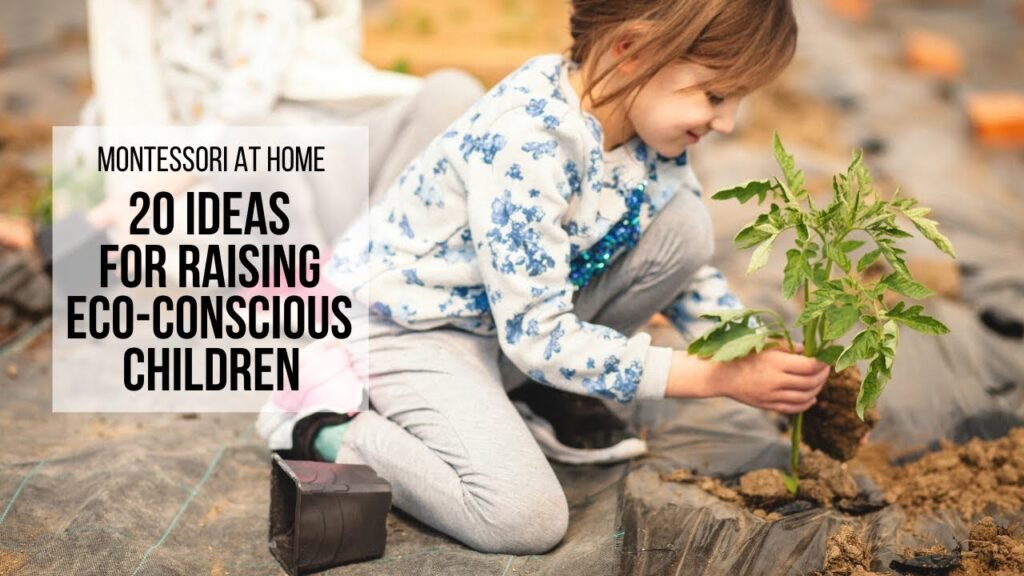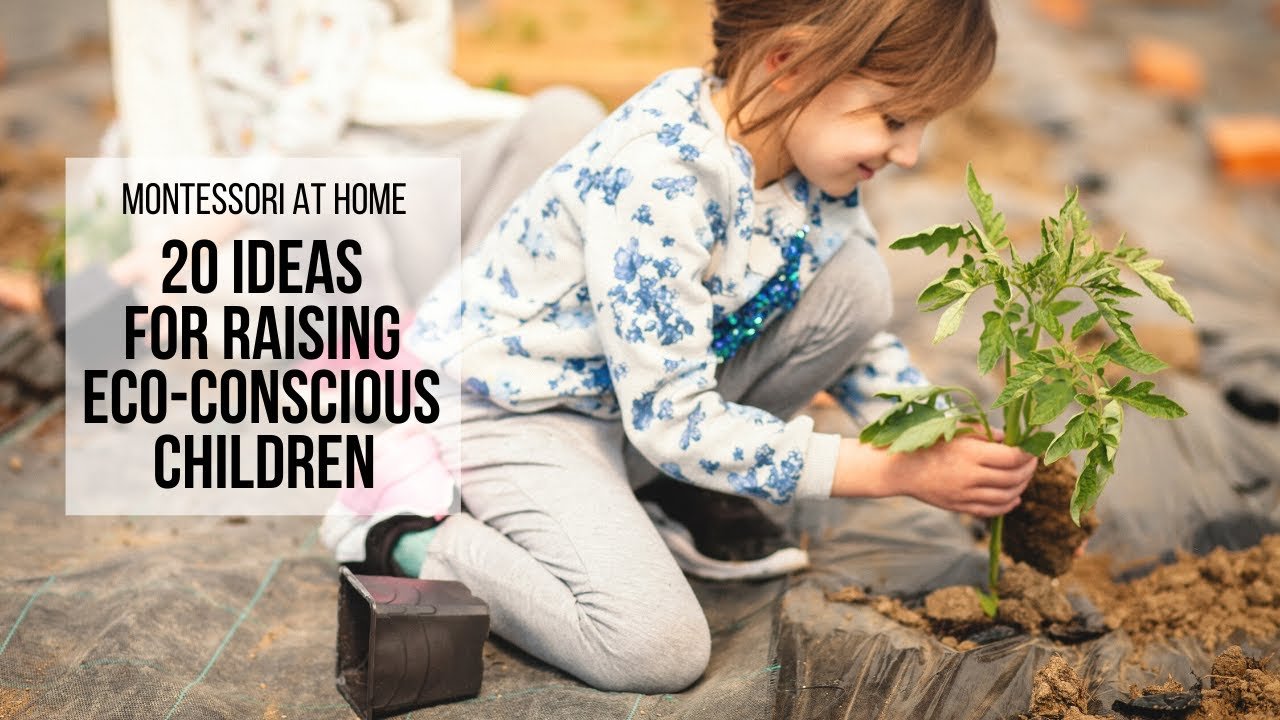Hi there! When it comes to raising eco-conscious children, incorporating Montessori practices at home can make a big impact. Dr. Montessori recognized the natural connection young children have with nature, emphasizing the importance of avoiding plastic and using natural materials. By teaching children about environmental stewardship and responsibility, you can instill valuable values from an early age. Simple practices like water and energy conservation, using reusable products, and getting children involved in outdoor activities can foster a sense of care for the environment.
Additionally, making small changes like shopping local and organic, biking to school, and using cloth diapers can all contribute to a more sustainable lifestyle. Encouraging children to donate old goods, garden, and compost can also help them develop a strong sense of environmental awareness. By incorporating eco-conscious practices into your everyday life, you are setting a positive example for the next generation, empowering them to make a difference in the world around them.

Overview of Montessori at Home
Dr. Montessori’s emphasis on nature connection
If you’re incorporating Montessori principles at home, you likely understand the importance of Dr. Montessori’s emphasis on the innate connection young children have with nature. Dr. Maria Montessori believed in fostering and maintaining this connection through intentional experiences provided by adults. By engaging children with nature and avoiding plastic, you can create a more nurturing environment that aligns with Montessori philosophy.
Avoiding plastic and promoting natural materials
In Montessori education, there is a strong focus on using natural materials over plastic. Investing in higher quality materials such as wood and other natural components for toys and play spaces can contribute to a more eco-friendly environment. By avoiding plastic and choosing natural materials, you’re not only fostering a deeper connection with nature but also promoting sustainability within your home.
Importance of Eco-Conscious Practices for Children
Teaching environmental stewardship and responsibility
Incorporating eco-conscious practices at home is vital for teaching children about environmental stewardship and responsibility. By instilling values of caring for the planet in your children from a young age, you’re helping shape their attitudes towards sustainability and environmental conservation. These lessons can have a lasting impact on their upbringing and their role as future stewards of the Earth.
Beneficial impact on children’s upbringing
By adopting eco-conscious practices at home, you can create a positive impact on your children’s upbringing. Teaching them about the importance of sustainability, conservation, and responsible consumption can help them develop a deep appreciation for the environment. These values can translate into their daily lives and influence their behavior as they grow into environmentally conscious individuals.
Practical Eco-Friendly Ideas for Children at Home
Teaching water and energy conservation
One practical way to introduce eco-friendly practices to children is by teaching them about water and energy conservation. Simple actions such as turning off the faucet when not in use, switching off lights in empty rooms, and using energy-efficient appliances can instill eco-conscious habits in children. By involving them in these daily tasks, you’re empowering them to make a positive impact on the environment.
Using reusable products and reducing waste
Encouraging your family to use reusable products such as water bottles and shopping bags can significantly reduce waste and plastic consumption. By embracing reusable alternatives, you’re teaching children the importance of sustainability and the benefits of reducing single-use items. Additionally, minimizing waste through proper recycling practices can further reinforce eco-friendly behavior in children.
Donating old goods and recycling materials
Getting children involved in donating old goods and recycling materials can be a valuable lesson in environmental responsibility. Engaging them in decluttering and sorting through items to donate can help them understand the importance of reusing and repurposing resources. By instilling a mindset of giving back to the community and recycling materials, children can develop a sense of environmental stewardship from a young age.
Outdoor Activities for Children
Getting children involved in outdoor activities
Engaging children in outdoor activities is an excellent way to foster a love and appreciation for nature. Encouraging them to spend time outdoors, whether through hiking, gardening, or nature walks, can help them connect with the natural world. By facilitating outdoor experiences, children can develop a deeper sense of environmental awareness and respect for the Earth.
Composting and gardening for environmental care
Introducing children to activities like composting and gardening can further enhance their understanding of environmental care. By composting kitchen scraps and participating in gardening projects, children can witness the cycle of growth and decomposition firsthand. These hands-on experiences not only teach valuable lessons about sustainability but also promote a deeper connection to the environment.
Impact of Local and Organic Choices
Shopping local and organic products
Opting for local and organic products can have a positive impact on the environment and support sustainable practices. By choosing locally sourced items and organic produce, you’re reducing carbon emissions associated with transportation and supporting eco-friendly farming methods. Incorporating these choices into your family’s lifestyle can contribute to a healthier environment and a more sustainable future.
Adopting a plant-based diet for positive impact
Transitioning to a plant-based diet can also be a significant step towards eco-conscious living. By reducing meat consumption and incorporating more plant-based foods into your meals, you can promote environmental sustainability. Plant-based diets have been linked to lower carbon footprints and reduced environmental impact, making them a beneficial choice for both health and the planet.
Simple Ways to Reduce Waste
Using cloth diapers instead of disposable ones
Choosing cloth diapers over disposable options can significantly reduce waste and promote eco-friendly practices. Cloth diapers are reusable, making them a sustainable alternative that minimizes environmental impact. By opting for cloth diapers and incorporating them into your child’s routine, you’re contributing to waste reduction and sustainability efforts.
Making environmentally-friendly cleaning supplies at home
Creating environmentally-friendly cleaning supplies at home is another simple way to reduce waste and promote sustainability. By using natural ingredients such as vinegar, baking soda, and essential oils, you can make effective cleaning solutions that are safe for your family and the environment. These homemade cleaners are a cost-effective and eco-friendly alternative to commercial products.
Eco-Friendly Transportation Options
Encouraging biking to school as an eco-friendly transport choice
Encouraging biking to school can be a fun and eco-friendly transportation option for children. By promoting cycling as a mode of transport, you’re not only reducing carbon emissions but also promoting physical activity and a healthy lifestyle. Biking to school can create lasting habits that support environmental conservation and personal well-being.
Additional Resources for Eco-Conscious Parenting
Exploring e-courses on Montessori and positive discipline parenting for further learning
For parents interested in further exploring eco-conscious parenting practices, e-courses on Montessori and positive discipline parenting can be valuable resources. These online courses provide in-depth information and strategies for incorporating sustainable practices into your family’s daily life. By delving into these courses, you can gain additional insights and guidance on raising eco-conscious children.
Affiliate Links and Contact Information
Affiliate links may be included in Hapa Family’s video description
In the video “MONTESSORI AT HOME: 20 Ideas for Raising Eco-Conscious Children” by Hapa Family, affiliate links may be included in the description for commission purposes. These links provide an opportunity for viewers to support the channel by making purchases through the provided links. By utilizing affiliate links, content creators like Hapa Family can continue to provide free and informative content to their audience.
Contact hapafamilyvlog@gmail.com for business inquiries
For business inquiries related to eco-conscious parenting and Montessori practices, viewers can contact Hapa Family via email at hapafamilyvlog@gmail.com. This contact information serves as a gateway for establishing collaborations, partnerships, or other professional engagements with Hapa Family regarding eco-conscious parenting content and initiatives.
Conclusion
Incorporating eco-friendly practices at home is essential for raising eco-conscious children
In conclusion, incorporating eco-friendly practices at home plays a crucial role in raising eco-conscious children. By emphasizing nature connection, avoiding plastic, and promoting sustainability, parents can instill values of environmental stewardship and responsibility in their children. Through practical ideas such as water and energy conservation, using reusable products, and outdoor activities, families can cultivate eco-friendly habits that benefit both the planet and future generations. By making conscious choices in daily life and embracing eco-conscious parenting strategies, you can help shape a brighter and more sustainable future for your children.

